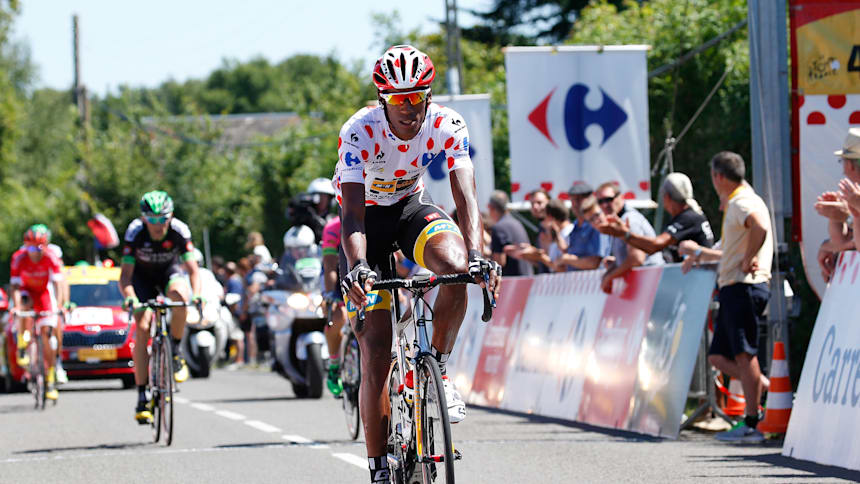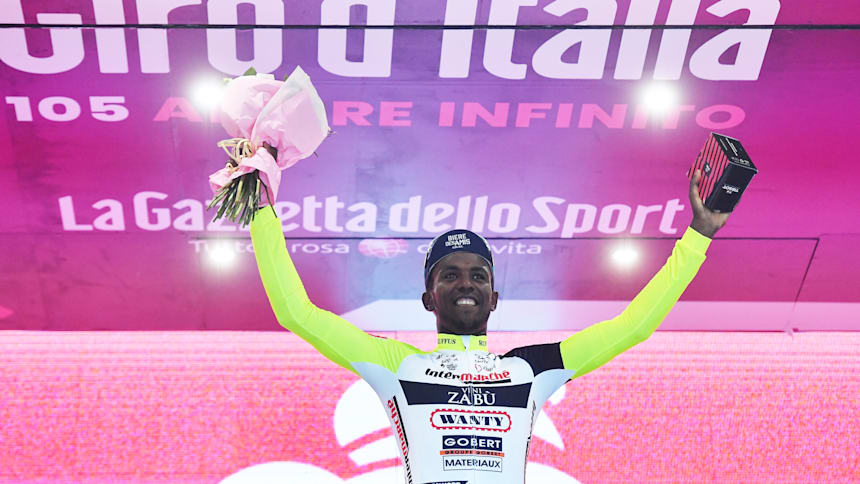When Biniam Girmay became the first Black African to win a road cycling men's Grand Tour stage at the 2022 Giro d'Italia, his Eritrean compatriots celebrated.
One in particular more so than others: Daniel Teklehaimanot, the first athlete from the Horn of Africa nation to compete at the Olympics in a sport other than track and field.
Long before Biniam Girmay even turned pro, Daniel – Eritreans are referred to by their given names, rather than their patronymics – had broken through the glass ceiling for Africa.
In 2015, he won the mountains classification at the Critérium du Dauphiné, a Tour de France warm-up race, before subsequently becoming the first African cyclist to wear the polka dot jersey as king of the mountains leader on the Tour.
Unsurprisingly, his success inspired a generation which included Biniam, much like the latter is doing now.
"The dream for Eritrea is to participate (in Grand Tours), especially in the Tour de France," he told Olympics.com in October. "When I was on the podium in the Grand Tours I was really happy, the entire continent was really happy.
"Just being part of the race is really a big deal for Black Africans. We hadn't [seen it] before, that we're in Tour de France, in the big races, on the TV," he explained.
"When I was in the [peloton] in the middle of the big riders, it was a bit stressful the first time, but when it's going well, it's really nice. So I was really excited."
-
Daniel Teklehaimanot was the first African to wear the Tour de France polka dot jersey, doing so in 2015.
Daniel Teklehaimanot: Biniam Girmay's talent "brilliant"
Before the world knew of Biniam Girmay, Daniel did. The pair have ridden together many times for Eritrea's national team, in both international competitions as well as UCI Africa Tour stage races in which some national teams compete alongside trade teams.
"He was really young when we did the Tour of Gabon (La Tropicale Amissa Bongo) together [in 2019]," Daniel recalled. "He was so fast. He's a really strong rider; his potential was really bright.
"I can't believe for him the success he has had in this short period. His sprints with the big riders of the world, in such a short period of time, is his talent, which I think is brilliant."
Thanks to the trail blazed by him, Biniam, and others, slowly more Eritreans and Black Africans are taking notice of cycling.
"We have a different kind of rider, strong riders, not only Biniam or Daniel or Natnael [Berhane]," Daniel said.
"Now there's a lot of riders. There's great potential in this country, for me it's exciting.
"Since I've been coming to Europe [to race], it has completely changed. Now there's more than 15 [Eritrean] riders in the pro ranks."
In 2022, Biniam Girmay sealed the first Grand Tour stage win by a Black African at the Giro d'Italia.
The cycling future for Eritrea and Black Africa
The UCI Road World Championships head to Africa for the first time next year, when Kigali, Rwanda, will play host.
It's easy to suggest that the rapid development of professional cycling among Black Africans can be traced back to Daniel's success in the last decade, and the 36-year-old Eritrean appeared content with his 'pioneer' tag.
"It's really huge for me. Winning some races, being part of the professional riders, for Africans is really a bit hard. [Starting] in 2009, I was for three years training in Aigle (at the UCI World Cycling Centre).
"I was really happy to be part of the professional peloton in 2012 with the ProTour teams."
A stumbling block stopping more Black African riders from making it pro in Europe, Daniel said, was the prohibitive cost of racing on high-tech frames.
"It's really expensive, of course, in our countries." But, with a long tradition in the sport – albeit on everyday bicycles – he sees things changing, helped by athletes like Biniam.
"Eritrea is a country of cycling and has a lot of riders. I think most of the people, from being children until they are grandfathers, are riding bikes. The Italians colonised Eritrea a long time ago until the 1940s," he said of the history of cycling in his country.
"Until the 90s, inside Eritrea - and still [today] - common [mass] races are very, very big."
Daniel thinks a Black African can win the general classification (GC) at a Grand Tour, such as the Tour de France's iconic yellow jersey, "if they're working really hard, maybe not that long.
"Between 10, 15 years. The GC is not easy. It needs to be from the young, we can build the grassroots for cycling. We must work really hard, it's a lot of work for us. It's not only just winning, we need to join the big training camps.
"If we are working, the future will be really bright."








